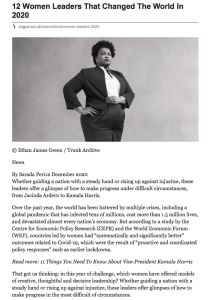
Article
12 Women Leaders That Changed the World in 2020
Whether guiding a nation with a steady hand or rising up against injustice, these leaders offer a glimpse of how to make progress under difficult circumstances, from Jacinda Ardern to Kamala Harris.
British Vogue,
2020
Recommendation
A study by the Centre for Economic Policy Research found countries that women led during the 2020 pandemic fared significantly better than those men led. Journalist Sarada Peri lauds a dozen female leaders in British Vogue, including heads of state, and explains how women in leadership made the world better in 2020. From high-profile politicians like Kamala Harris and Jacinda Ardern to courageous activists like Nemonte Nenquimo and Bilkis Dadi, the author recognizes these leaders’ incredible work during a difficult year.
Summary
About the Author
Sarada Peri, a senior speechwriter for Barack Obama during his presidency, founded Peri Communications.
Learners who read this summary also read
Book
Podcast
















Comment on this summary